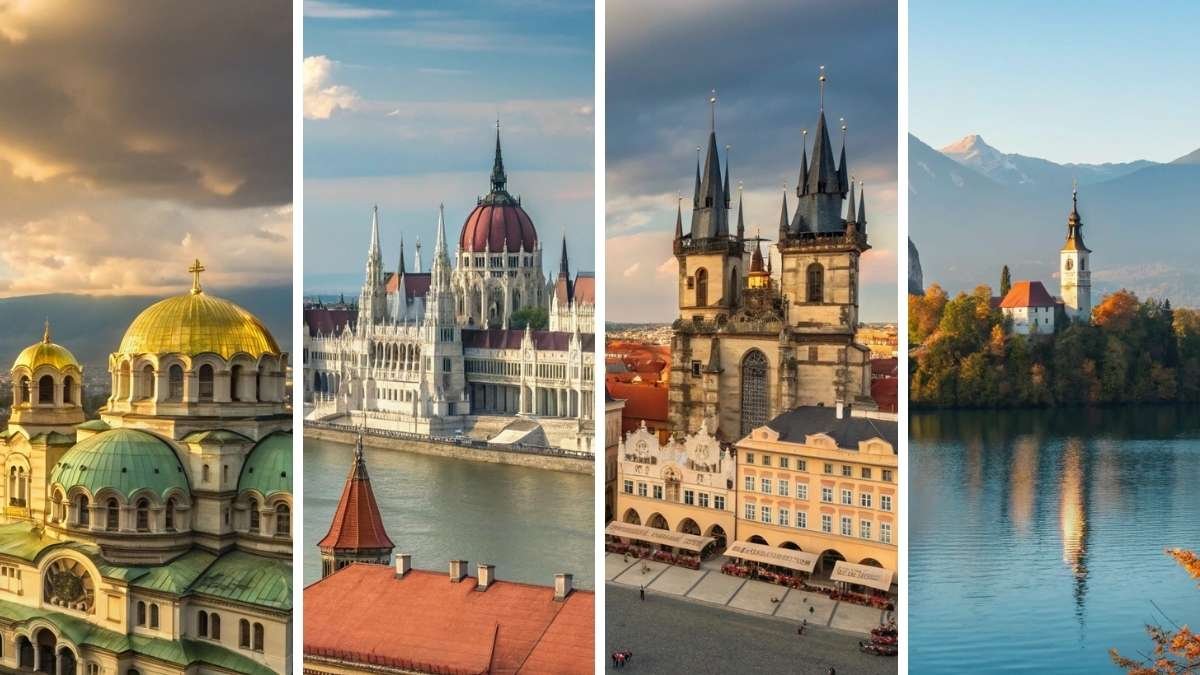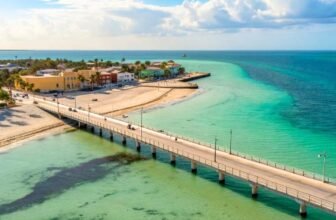
You’ve finally cracked the remote work dream—freedom, flexibility, and the whole world as your office. But there’s one thing still dragging behind: taxes.
What if there were countries quietly offering legal ways to keep more of what you earn, without jumping through flaming hoops or risking IRS trouble? There are. And no, they’re not the obvious choices.
These hidden gems have tax treaties that smart American remote workers are using to live better, save more, and stay compliant—all while exploring vibrant cultures and high-quality living abroad. If you’re ready to trade stress for strategy, this list is your new roadmap.
1. Portugal

Portugal has quietly become a remote worker’s dream—not just for the surf and custard tarts, but because of its favorable U.S.-Portugal tax treaty and Non-Habitual Resident (NHR) regime. This setup offers significant tax exemptions on foreign income (including U.S.-sourced income) for up to 10 years, provided you meet the eligibility criteria. Even though the NHR program officially ended for new applicants in 2024, those who applied before the cutoff or qualify under transition rules can still benefit.
Under the U.S.-Portugal tax treaty, many types of income, like pensions, dividends, royalties, and interest, are either taxed at reduced rates or exempt from local tax entirely. This dual-layer tax shield makes Portugal a unique loophole destination for Americans looking to avoid the IRS and local tax authorities from taking double bites out of their earnings.
The bureaucratic process can be sluggish, and speaking a little Portuguese helps, but overall, Portugal strikes a great balance between lifestyle and legality. It’s Schengen-zoned, has affordable healthcare, and offers residency pathways through the D7 or digital nomad visa.
Quick Guide
- Best months to visit/live: April–June & September–October (mild, less touristy)
- Digital Nomad Visa: Yes – launched in 2022
- Public Health System: Accessible with residency
- Notable Tax Perks: NHR program, no tax on U.S. dividends under treaty
- Cost of Living: Moderate, especially inland
- Tax Residency Trigger: 183+ days or habitual residence
2. Malta

Malta is a bit of a stealth player. It doesn’t often top digital nomad lists, but it should—especially for Americans. Thanks to its U.S.-Malta tax treaty, income that’s not remitted to Malta (i.e., left in a U.S. bank) isn’t taxed locally under the country’s remittance-based tax system. That’s a big deal if you’re working remotely for a U.S. company.
The treaty helps avoid double taxation on U.S. income and provides tax credits if Malta does end up taxing certain types of income. Combine that with Malta’s nomad residence permit, which is open to remote workers earning at least €32,400 per year, and you’ve got a very solid legal route for long stays without high tax burdens.
Also, Malta is an English-speaking country (a rarity in the EU), so settling in is smoother than you might expect. Bureaucracy exists, yes, but it’s navigable—and the Mediterranean views don’t hurt either.
Quick Guide
- Best months to visit/live: March–May & September–November
- Digital Nomad Visa: Yes – Nomad Residence Permit
- Public Health System: Excellent, hybrid public/private
- Notable Tax Perks: Remittance basis taxation, treaty prevents U.S. double taxation
- Cost of Living: Mid-high, depending on location
- Tax Residency Trigger: 183+ days or habitual residence
3. Ireland

Ireland’s tech-forward economy and U.S.-Ireland tax treaty make it a surprisingly practical base for American remote workers. The treaty prevents double taxation on almost all common income types, and even provides tax credits for U.S. tax paid on income earned in Ireland—perfect if you’re working with Irish clients or a U.S. company while living there.
What’s unique about Ireland is that its treaty includes specific exemptions for pension income, dividends, and capital gains under certain conditions. This can make a big difference if you’re freelancing or running your own LLC. And since both countries use the same language and business etiquette, American workers often find the cultural transition a breeze.
Ireland’s climate might be a bit gray and misty, but the people are famously friendly, and its major cities—especially Dublin and Galway—are cosmopolitan and welcoming. Remote workers with solid income can easily qualify for long-stay visas or EU pathways if eligible.
Quick Guide
- Best months to visit/live: May–September
- Digital Nomad Visa: No formal one, but long-stay options exist
- Public Health System: Strong but stretched—private insurance recommended
- Notable Tax Perks: Foreign tax credits, dividend exemptions, U.S. treaty protections
- Cost of Living: High in Dublin, moderate elsewhere
- Tax Residency Trigger: 183+ days or 280 days over 2 years
4. Greece

Greece’s tax regime has undergone some serious renovations lately—and it’s paying off. For American remote workers, the U.S.-Greece tax treaty limits double taxation, especially for passive income like interest, dividends, and royalties. But the real kicker is Greece’s 50% income tax exemption for new residents for up to 7 years, introduced as part of its post-crisis investment incentives.
This exemption applies even if you’re working remotely for a U.S. company, provided you become a tax resident in Greece. With a valid long-term visa (like the digital nomad visa launched in 2021), it’s surprisingly straightforward to establish legal residency.
If you’re willing to deal with some Greek bureaucracy (and you will), the tradeoff is access to a deeply rich culture, affordable living, and long stretches of coastline. And honestly, your Zoom calls look better with the Aegean in the background.
Quick Guide
- Best months to visit/live: April–June & September–October
- Digital Nomad Visa: Yes – income requirement ~€3,500/month
- Public Health System: Decent; private care is common for expats
- Notable Tax Perks: 50% tax break for 7 years, treaty covers passive income
- Cost of Living: Low to moderate
- Tax Residency Trigger: 183+ days or habitual abode
5. Czech Republic

Don’t overlook the Czech Republic. Its tax treaty with the U.S. protects remote workers from dual taxation and provides clear credit mechanisms if income is taxed locally. While it doesn’t have the same flashy tax incentives as Greece or Malta, it quietly offers one of the most stable legal environments in Eastern Europe for remote workers.
American freelancers and business owners can benefit particularly from the treaty’s provisions on independent personal services and self-employment, which allow income to remain U.S.-taxable only, provided you don’t create a permanent establishment in the Czech Republic.
The country’s Zivno visa is a popular (albeit bureaucratic) pathway for remote workers. Prague is cosmopolitan and deeply livable, while smaller cities like Brno offer charm, affordability, and reliable infrastructure.
Quick Guide
- Best months to visit/live: May–September
- Digital Nomad Visa: No, but a Zivnostenský visa (freelancer visa) is a viable option
- Public Health System: Universal and high-quality
- Notable Tax Perks: No double taxation, treaty allows self-employment flexibility
- Cost of Living: Low to moderate
- Tax Residency Trigger: 183+ days or center of life interests
6. South Korea

South Korea might not be the first place you’d associate with tax efficiency, but its U.S.-South Korea tax treaty contains some overlooked gems, especially for employees of U.S. companies or freelancers who maintain U.S.-based clients. The treaty offers tax exemptions for certain types of income (like teaching or short-term business income) and tax credits to avoid double taxation on active income.
For remote workers, the most useful clause allows for income to be taxable only in the U.S. if the worker is in Korea for less than 183 days, is paid from the U.S., and the income isn’t borne by a Korean entity. This allows for short- to mid-term stays without incurring Korean taxes, provided you plan your stay wisely.
On the ground, Korea offers fast internet, top-tier infrastructure, and a culture that rewards productivity. Seoul, in particular, is ideal for digital work. It’s also safe, efficient, and full of co-working spaces. You’ll want to brush up on some local etiquette, but English-friendly communities do exist.
Quick Guide
- Best months to visit/live: April–June & September–November
- Digital Nomad Visa: No dedicated visa yet; long-stay and workarounds exist
- Public Health System: Excellent and affordable with national insurance
- Notable Tax Perks: 183-day rule, U.S.-paid income exemptions, treaty-based credits
- Cost of Living: Moderate to high in Seoul
7. Thailand

Thailand’s cost of living and lifestyle perks are well known—but less often discussed is its U.S.-Thailand tax treaty, which helps eliminate double taxation on income, especially for self-employed individuals and independent contractors. While Thailand taxes residents on worldwide income, foreign income is not taxed if it’s not remitted in the same tax year—a key loophole for strategic earners.
So if you’re earning in the U.S. and delaying remittance, you can legally avoid Thai taxation altogether. Combine that with the treaty protections, and it becomes a savvy legal tax move, as long as you’re disciplined with your finances.
Thailand also recently introduced a long-term resident visa for remote professionals with higher income requirements (~$80k/year), but many digital nomads still enter on extended tourist visas or education visa paths. Chiang Mai and Bangkok are hotbeds for nomads, with strong infrastructure and international communities.
Quick Guide
- Best months to visit/live: November–February
- Digital Nomad Visa: Limited; LTR visa or education/elite visas used
- Public Health System: Affordable private healthcare
- Notable Tax Perks: Remittance basis taxation + treaty benefits for freelancers
- Cost of Living: Low to moderate
- Tax Residency Trigger: 180+ days
8. Philippines

The U.S.-Philippines tax treaty has been in place for decades and provides a clear system of exemptions and foreign tax credits, particularly useful for U.S. citizens working remotely and paying U.S. taxes. One notable perk: U.S. citizens are only taxed on Philippine-sourced income by local authorities. So, if your income comes from the U.S., it’s not subject to Philippine tax—a huge relief for digital nomads.
This treaty structure makes the Philippines extremely friendly for American freelancers and employees of U.S. companies. Combine that with the fact that English is widely spoken and the culture is generally very pro-American, and you get a legally smooth and socially easy expat experience.
Manila is busy, but places like Cebu and Dumaguete offer a quieter, still-connected lifestyle. It’s also incredibly affordable, meaning your dollars go far, especially if you’re paying U.S. taxes only.
Quick Guide
- Best months to visit/live: December–March (dry season)
- Digital Nomad Visa: No official one; extended tourist and special resident visas are used
- Public Health System: Basic; private insurance is a must
- Notable Tax Perks: Foreign-source income not taxed; treaty protections in place
- Cost of Living: Very low
- Tax Residency Trigger: 180+ days
9. Israel

Israel’s U.S.-Israel tax treaty is one of the more detailed bilateral agreements, offering a wide range of exemptions and credits, especially for business profits, royalties, and pensions. The treaty works well in tandem with Israel’s 10-year tax exemption on foreign income for new immigrants or returning residents (Olim), making it a strategic destination for American Jews or dual citizens.
Even if you’re not eligible for the 10-year exemption, the treaty ensures that U.S.-source income isn’t double-taxed, and the tax credit system ensures fairness if local taxes apply. Freelancers, LLC owners, and remote employees all benefit from the clarity and depth of the treaty.
Israel’s tech-friendly culture, widespread English use, and modern amenities make it a surprisingly easy place for Americans to work remotely. Tel Aviv is buzzing, but cities like Haifa or Jerusalem offer quieter options without losing infrastructure.
Quick Guide
- Best months to visit/live: March–May & September–November
- Digital Nomad Visa: No formal one, but extended stays via B/2 visa or repatriation options
- Public Health System: Excellent; semi-private and public mix
- Notable Tax Perks: 10-year exemption (Olim), treaty credits for U.S. tax paid
- Cost of Living: High in Tel Aviv; moderate elsewhere
- Tax Residency Trigger: 183+ days or the center of life test
10. Romania

Romania isn’t on most tax-optimization radars, but it should be. It has a U.S.-Romania tax treaty that avoids double taxation and specifically limits taxation on things like dividends, royalties, and independent personal services. The treaty ensures that U.S.-sourced income can stay U.S.-taxable only, as long as you don’t create a Romanian permanent establishment.
Romania recently introduced a digital nomad visa for non-EU remote workers earning ~€3,300/month, allowing for a one-year renewable stay with zero local income tax obligations on foreign earnings—if you meet the rules.
Bucharest is Europe’s sleeper tech city: fast internet, excellent infrastructure, and loads of co-working spaces. And the cost of living is one of the lowest in the EU. Add the Carpathians, castles, and a surprisingly good food scene, and it becomes a smart, tax-efficient base.
Quick Guide
- Best months to visit/live: April–June & September–October
- Digital Nomad Visa: Yes – launched in 2022
- Public Health System: Basic public care; private insurance advised
- Notable Tax Perks: No local tax on foreign income under the nomad visa; treaty protections
- Cost of Living: Low
- Tax Residency Trigger: 183+ days or habitual residence
11. Slovakia

Slovakia is the type of place that flies under the radar—quiet, scenic, and surprisingly well-positioned for remote workers focused on smart tax planning. Thanks to the U.S.-Slovakia tax treaty, most U.S.-source income, including dividends, pensions, and freelance earnings, can either be exempt from Slovak taxes or offset via foreign tax credits.
It also helps that Slovakia doesn’t aggressively tax non-local income if you’re not deeply tied into the system. Remote workers on long-stay or freelance visas can often maintain U.S.-only taxation with proper documentation and timing. This makes it an appealing alternative to its flashier Western European neighbors.
Bratislava, the capital, is just an hour from Vienna, giving you central access to Europe but with a much lower cost of living. You get the benefits of an EU country—Schengen access, reliable healthcare, and solid infrastructure—without paying EU-premium prices.
Quick Guide
- Best months to visit/live: May–September
- Digital Nomad Visa: No formal one, but freelance and business visas apply
- Public Health System: Good public care; private is expanding
- Notable Tax Perks: U.S. income treaty protections, low enforcement on foreign earnings
- Cost of Living: Low to moderate
- Tax Residency Trigger: 183+ days or center of life ties
12. Hungary

Hungary offers an ideal mix for remote workers who are looking for structure without bureaucracy overload. The U.S.-Hungary tax treaty is particularly beneficial for those earning U.S. income, as it clearly outlines which income types are taxed where and protects from double taxation.
For remote workers with self-employed income, the treaty ensures that as long as you don’t establish a permanent presence in Hungary (like a registered office), your U.S. income is not taxable locally. Add Hungary’s White Card visa, launched for digital nomads, and you’ve got a legit way to stay for up to two years without triggering local taxes—if structured properly.
Budapest is stylish, affordable, and full of remote work infrastructure. You’ve got centuries-old cafés, thermal spas, lightning-fast internet, and co-working spaces—all wrapped into a deeply livable European capital.
Quick Guide
- Best months to visit/live: April–June & September–October
- Digital Nomad Visa: Yes – White Card Visa
- Public Health System: Decent, with robust private options
- Notable Tax Perks: Treaty shields U.S. self-employed income; clear residency rules
- Cost of Living: Moderate, very affordable for a capital city
- Tax Residency Trigger: 183+ days or center of life interests
13. Slovenia

Slovenia is clean, safe, and absurdly photogenic, and while it’s not usually part of digital nomad conversations, it deserves a second look—especially for U.S. expats aiming to optimize taxes legally. Its tax treaty with the U.S. provides solid protection for American remote workers, especially regarding business income and passive earnings.
Slovenia is very tax-resident conscious, and if you’re staying under the radar (i.e., under 183 days, no local business registration), you can often avoid local taxation altogether while still enjoying a long-term stay via freelancer or entrepreneur pathways. The treaty also includes generous foreign tax credit provisions if any income is taxed locally.
From an infrastructure point of view, Slovenia is a dream. Ljubljana is small but modern, the countryside is stunning, and the proximity to Italy, Austria, and Croatia gives you weekend adventure access on a budget.
Quick Guide
- Best months to visit/live: May–September
- Digital Nomad Visa: No formal one, but entrepreneur visas and long stays are possible
- Public Health System: Strong public care
- Notable Tax Perks: U.S. treaty credits, passive income protections, low enforcement
- Cost of Living: Moderate
- Tax Residency Trigger: 183+ days or habitual center of interests
14. Bulgaria

Last but certainly not least—Bulgaria. Often dismissed as just another Eastern European option, Bulgaria offers one of the lowest personal income tax rates in the EU at a flat 10%, and that’s before you even factor in the U.S.-Bulgaria tax treaty.
The treaty helps eliminate double taxation on most income types, particularly salaries, business profits, and investment income. If you’re self-employed or running an LLC remotely, you’ll appreciate the clarity in how business income is handled between the two countries. Bulgaria also doesn’t aggressively go after foreign income unless you’ve established tax residency.
Sofia is growing in reputation among digital nomads for its low costs, high-speed internet, and relaxed visa environment. While the culture may require some adjustment, the freedom and affordability more than make up for the paperwork.
Quick Guide
- Best months to visit/live: May–October
- Digital Nomad Visa: No formal one; residency permits for freelancers are possible
- Public Health System: Basic public, but inexpensive private care
- Notable Tax Perks: 10% flat tax, treaty prevents U.S. income double taxation
- Cost of Living: Very low
- Tax Residency Trigger: 183+ days or permanent residence






